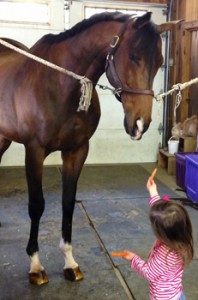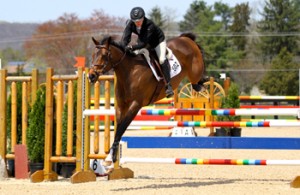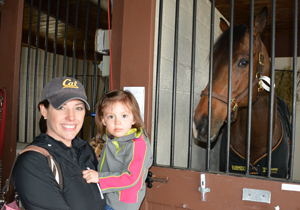Champion Jumper in Nine-Month Chemotherapy For Lymphoma
By: Louisa Shepard
Penn Vet Extra (provided with permission)
One of the competitors at the Devon Horse Show this year will be an unlikely Thoroughbred champion currently undergoing chemotherapy for lymphoma at Penn Vet’s New Bolton Center.
Jane Withstandley, his devoted owner, will be riding him in the Adult Jumper classes, returning 18 years after she last competed in this storied show.
Calvin, whose show name is Stateside, is in remission and responding well to the treatment, said Dr. Amy Johnson, assistant professor of large-animal medicine and neurology at New Bolton Center. The 11-year-old bay gelding was diagnosed with lymphoma of the skin, and in March, started a full nine-month protocol of chemotherapy involving five drugs.
“You want them to go into remission quickly,” Dr. Johnson said, noting that Calvin’s cancer was in remission with all symptoms gone after the first two treatments. “The best chance you have of curing them or keeping them in remission for a really long time is continuing the whole course of treatment.”
Withstandley learned that Calvin qualified for Devon in April. Quite an accomplishment for a former racehorse that was nearly un-rideable when Withstandley bought him for only $5,000 four years ago.
“He has natural athletic ability over the jumps that you just can’t teach,” Withstandley said in a recent interview, explaining why she chose him. “It’s just there.”
Calvin also has a naturally sweet nature, especially with Withstandley’s three-year-old daughter, Blair, known simply as “B” to her family. He stands still when she brushes his legs and shares her lunch. The farrier even painted his hooves with sparkle pink polish to please her.
Equine Chemotherapy
Perhaps it is because he has learned to be patient with Blair that he is so patient when he gets his chemotherapy treatments. Withstandley trailers him from her trainer’s stable in Chester Springs to New Bolton Center for his treatments once every week, or every two or three weeks depending on the protocol, leaving him overnight and picking him up the next day.
He stands like a rock for every single treatment. It’s pretty amazing,” Dr. Johnson said. “The last treatment took over an hour. He stood perfectly still.”
Dr. Johnson, who is managing Calvin’s treatment, reached out to a Penn Vet graduate in Australia to develop the chemotherapy protocol. Dr. Angela Frimberger of Veterinary Oncology Consultants Pty Ltd developed a treatment of five chemotherapy drugs to be administered in rotation four times over nine months.
The veterinarians must suit up with protective gear each time they administer the drugs, which are the same as those used for humans. The drugs are cytotoxic, which means they kill rapidly dividing cells.
“If the same people are working with the drugs week after week, you have to make sure that they don’t absorb any of them through the skin or mucous membranes,” Dr. Johnson said.
Originally the protocol had five drugs, but Calvin had some side effects — including fever — to one of the drugs that is often problematic for humans, too, and they have removed it from his regimen. Horses, however, do not have the same side effects as humans to the drugs, such as nausea and hair loss.
“The goal is to treat the cancer as effectively as we can without sacrificing any quality of life,” Dr. Johnson said. “We want to make sure they don’t suffer during the course of treatment.”
Dr. Frimberger said dose and drug adjustments are common in veterinary chemotherapy because they tailor the treatment to the individual’s needs and responses. The protocol requires regular monitoring. Nearly every clinician in New Bolton Center’s medicine service has worked with Calvin to make sure he is responding well.
“Quality of life is always our top priority for animal cancer patients, so we never try to ‘push through’ a side effect that could put that in jeopardy,” Dr. Frimberger said. “What I most want is for him to be a happy horse, jumping and doing his usual activities and not knowing there’s anything wrong.”
And Calvin is doing just that. Although his workload is a bit lighter, he has competed successfully in two shows since his cancer diagnosis and chemo treatments. He has won several classes in the past year, making it possible for him to qualify for Devon.
Withstandley and Calvin will show in up to three High Adult Jumper classes at the Devon Horse Show, with jumps set at 1.10 meters to 1.15 meters. The show runs from May 22 to June 1.
A Visit to New Bolton Center
An unusual abscess prompted Withstandley to bring Calvin to New Bolton Center in January. “As I said to one of the vets when I first brought Calvin in, I’ve never had a horse not come home from New Bolton,” she said. New Bolton vets twice had saved Clark, the horse she competed with while a teenager, with two colic surgeries, and solved a mystery illness for another horse, Buckley. Her mother’s horse also had surgery at New Bolton Center.
“So not only is New Bolton known as the best, but my family and our horses have a history of always receiving the best of care,” Withstandley said.
Veterinarians suspected at first that Calvin might have strangles, a highly contagious equine disease that can cause an infection in the lymph nodes. Calvin was admitted into the isolation wing of New Bolton’s James M. Moran, Jr. Critical Care Center, where he was diagnosed with an Actinomyces infection, a bacteria not commonly found in horses.
While in treatment, the veterinarians noticed nodules developing underneath the skin in Calvin’s hindquarters. Withstandley agreed to a biopsy, which confirmed the diagnosis of lymphoma.
“That was one of the worst days in recent memory for me. I was devastated. I just sat in the stall and cried,” Withstandley recalled, thinking back to when she received the news. “He didn’t deserve this. He is irreplaceable. He’s really a family member. He’s B’s horse.”
Dr. Johnson ordered a number of diagnostic tests to pinpoint the form of lymphoma and to determine if it was anywhere else in his body: complete radiographs of his chest, ultrasound of his abdomen, and cardiology exam of his heart, among other screening tests. Since there were no signs that the cancer had spread elsewhere, Dr. Johnson determined that his subcutaneous lymphoma could be treated.
They discussed three options:
1. No treatment, which most likely would have allowed Calvin to live for a few years with the nodules coming and going, but the cancer would have eventually spread.
2. Steroid treatments that could make the cancer go into remission temporarily, but would not be a long-term option or cure.
3. Chemotherapy, which was most likely to result in either a cure or a remission long enough for him to live out his natural lifespan.
“We decided to do the chemotherapy,” Withstandley said. “We wanted to find the most aggressive form of treatment, but we didn’t want Calvin to suffer at all.”
The oncology practice in Australia treats very few equine patients with a full protocol, and New Bolton Center rarely does so either, although lymphoma is often diagnosed in horses. “What is unusual is the combination of Ms. Withstandley’s commitment and perseverance in fighting it; and Dr. Johnson’s expertise and dedication to giving him the best chance possible at beating his cancer,” said Dr. Frimberger.
Now 34 years old, Withstandley lives in Devon with her husband, a lawyer for an engineering company, and daughter Blair, along with their French Bulldog and three cats. She and Blair visit Calvin twice a day, driving the half-hour each way to the stable. In the evening, Withstandley returns to ride and train Calvin while her husband puts Blair to bed.
Finding Her Horse
When Withstandley went looking for a horse to ride four years ago, she looked for one that didn’t cost a lot. No trainer, no vet check, she bought him on instinct, impressed by his powerful jumping ability. The tall Thoroughbred – standing at about 16 hands 2 inches – had been a racehorse, with a Jockey Club name Darksideoftheforce, and a barn name of Dunkin. He ran 20 races, earning one win and about $20,000 over his career. But he was very anxious and wary, making him nearly un-rideable when Withstandley started to train him.
“I spent a lot of time getting his trust back, getting him to focus, letting him know everything was okay,” Withstandley said, adding that she sought help from her current trainer, Diane Little of Peace by Piece Farm. “It takes patience.”
The breakthrough came in a Princeton show a year ago. “We went out there and I just let him go and it was the most fun I have ever had on a horse in my life. I thought, wow, this is what it is supposed to be like,” Withstandley said.
“He is a Thoroughbred. He is a jumper,” she continued. “You have to let him gallop, we discovered. If you let him gallop, he is more likely to come back to you and collect his stride.”
He started listening to her. “It is finding that balance,” she said. “It was just Calvin trusting me, me trusting Calvin.”
That’s when they decided they would try to qualify for Devon this year because “everything clicked and things were going well,” she said.
Withstandley was 16 years old, growing up in Haverford, when she last showed at the Devon Horse Show, in a Junior Hunter class.
“It would mean a lot to me to get back there, and on a horse that is extremely inexpensive compared to all the others. It’s been difficult and I’m very proud of him,” Withstandley said. “He’s amazing. That’s why I do all of this.”














